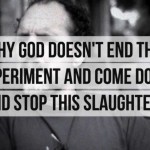We run our website the way we wished the whole internet worked: we provide high quality original content with no ads. We are funded solely by your direct support. Please consider supporting this project.
What is the significance of Revelation 3:5?
“If you conquer, you will be clothed like them in white robes, and I will not blot your name out of the book of life…”
If God is only the God of certainties, it is not clear how he can honestly speak in conditional terms (“If you conquer…”) and it is not clear why he would have to blot anyone’s name out of the book of life. If he has always been certain who will and will not “conquer,” why record the names of those he knows from the start—from all eternity!—will not conquer in the first place (cf. Exod. 32:33)?
Other scriptures describe names being recorded in God’s book of life from the foundation of the world (cf. Rev. 13:8, 17:8; for further explanation of how verses such as these square with Open Theism, see here and here). But no passage states that the names were written at or before the foundation of the world—which is what one would expect if the classical view of the future as exhaustively settled is true.
This verse also exposes the general inadequacy of the classical explanation of verses which show change in God. It explains such verses by saying that they speak to us in terms of how things appear (“phenomenological anthropomorphisms”), not as they truly are. But (however literally or figuratively we take this), when has anyone ever been privy to God’s book of life? The reason why this and many other verses don’t easily square with the classical explanation is that their subject matter lies outside the human purview. They describe what God thinks, feels, intends, or writes in his “private journal,” as it were. If any verses describe God as he truly is and not just how he appears to us, they are these verses!
Category: Q&A
Tags: Open Theism, Q&A
Topics: Open Theism
Verse: Revelation 3
Related Reading

Revelation 13:8 refers to “everyone whose names have not been written before the foundation of the world in the book of life.” How does that square with open theism?
Three possibilities exist in terms of reconciling Revelation 13:8 with open theism. 1) First, the “from the foundation of the world” clause can attach to either “everyone whose names have not been written” or to “the lamb that was slain.” For example, the TNIV translates this passage “All inhabitants of the earth will worship the…

How do you respond to Genesis 45:5; 50:20?
Joseph said to his brothers, “…now do not be distressed, or angry with yourselves, because you sold me here; for God sent me before you to preserve life,” (cf. v. 7). Joseph later says, “Even though you intended to do harm to me, God intended it for good, in order to preserve a numerous people…”…

What is the significance of Isaiah 5:3–7?
The Lord describes Israel as his vineyard. Referring to himself, he says that the owner of the vineyard loved his vineyard and did all he could to care for it. “[H]e expected it to yield grapes, but it yielded wild grapes” (vs. 2). Then the Lord asks, “What more was there to do for my…

Divine Wisdom
Why doesn’t God end it all and stop the slaughter? Why does God allow suffering and evil to go on so long? Here, Greg offers two possible answers to these questions. Option A is that all evil somehow is designed by God and somehow brings glory to him. But Greg thinks Option B is a better explanation, and it involves…

Do you believe God is pure actuality?
The basis of the classical view of God as pure actuality (actus purus) is the Aristotelian notion that potentiality is always potential for change and that something changes only because is lacks something else. So, a perfect being who lacks nothing must be devoid of potentiality, which means it must be pure actuality. I think…

Podcast: If the Future is Open How Can We Know God Wins in the End?
Greg discusses the open future and speculates on how God can still be assured victory in the end. http://traffic.libsyn.com/askgregboyd/Episode_0069.mp3
